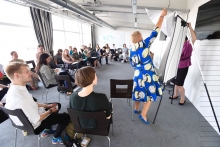Towards a global campaign on PPPs

In a world of extreme inequality, widespread poverty, and environmental fragility, the need for alternatives has never been greater. The global economic crisis proved the fragility of both the economic system and the model underpinning it. Agenda 2030 and the Sustainable Development Goals are unlikely to be achieved without significant changes to this global economic model and ideas and institutions that sustain it. Elections around the world are proving that there is widespread discontent across the political spectrum, and a willingness to consider radical alternatives.
Participants of the joint workshop discussed the rationale behind PPPs and agreed that PPPs are rooted in a broader context of neo-liberal policies that tend to reduce the role of the state and democratic control. We need to come up with concrete alternatives that incorporate democratic governance, transparency, cost efficiency and the protection of labour rights. Human rights impacts should be considered in PPP contracts, and HR safeguards should be clearly defined. Risk management – and not risk transfer from private to public – should be the rule. We need to develop both short and long terms objectives for our campaign, reach out to all relevant actors, including other CSOs and deliver stories that prove that the alternative can work.
Privatization of public goods is pushed forward by a number of key actors: the World Bank is at forefront of regional and multilateral development banks, and of course a number of multinationals in water, education, health, energy and waste management. We also recognize the growing role of large foundations and think thanks, as well as donors such as DFID and others, the G20 and the OECD. We need to build a strong media campaign to counter the current narrative in mass media, and work together with allies such as progressive governments, networks of city governments, rebel cities, other CSOs, but also universities who are shaping the business leaders of the future, and judges who implement national and international standards.
A global campaign on PPPs was recognized as being complementary to the work many CSOs and trade unions are doing, but it should not merely add another layer to our work. Rather, it should create new synergies and more in-depth cooperation, being holistic in its approach and specific in relation to local and national issues, as well as inclusive in terms of North-South representation. We need to develop a joint common strategy and map future work on a regular basis, we also need to exchange analysis, research and coordinate joint action. In parallel with the development of the PEOPLE OVER PROFIT (POP) platform, a working group should be set up to organize regular conference calls and advance the work of a set of common values (charter) to guide future cooperation. This process should contribute to behavioural change, joining forces to win!
This meeting was a pre-event to Eurodad’s International Conference 2017, co-hosted with Latindadd, ActionAid Netherlands, Both Ends, OIKOS, Oxfam Novib, SOMO, taking place in The Hague, The Netherlands, 20-22 June. The event brings together leading civil society thinkers from around the globe working on issues including debt, tax justice, aid, private finance, the International Financial Institutions (IFIs) and global monetary reform to discuss alternative policies for a sustainable world, better ways of financing global development and strengthening global economic regulation and governance.
For more information:
- See PSI's Privatisation pages
- Subscribe to PSI's "Privatization Watch" bulletin in English, Français or Español

